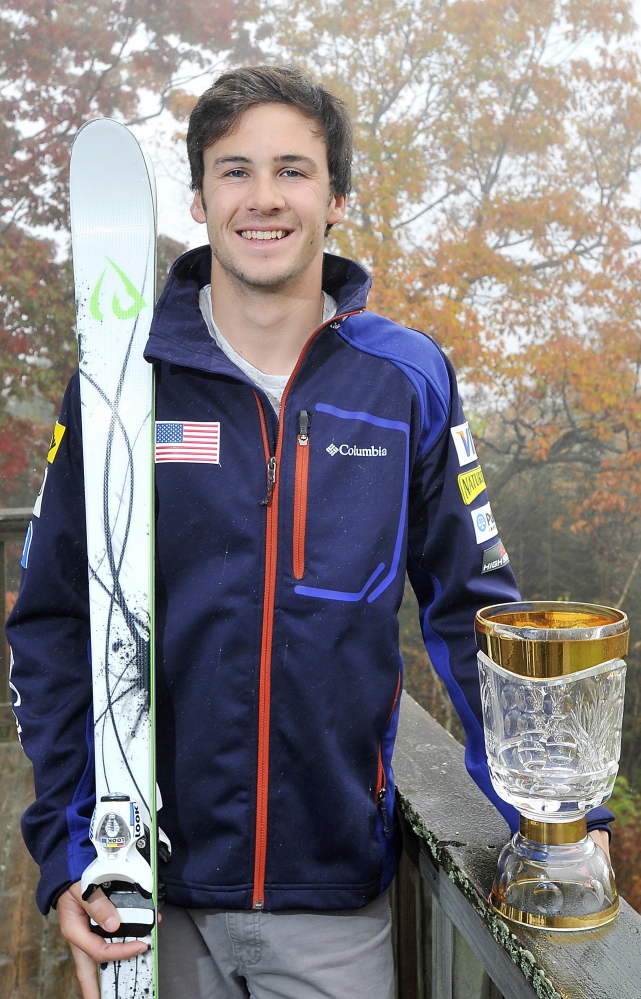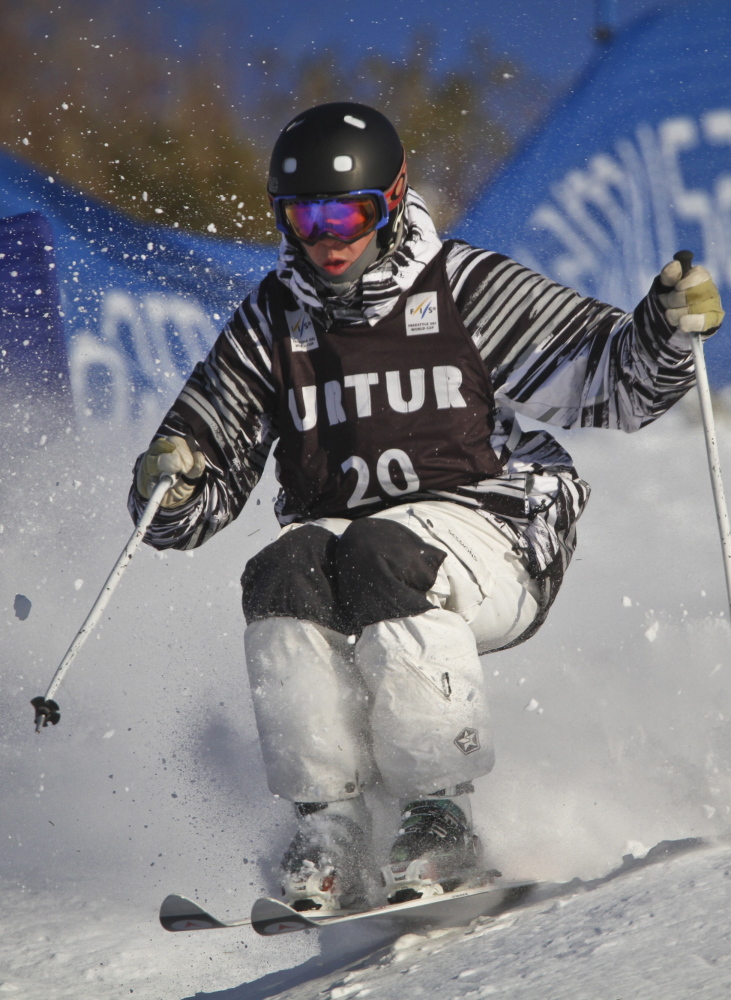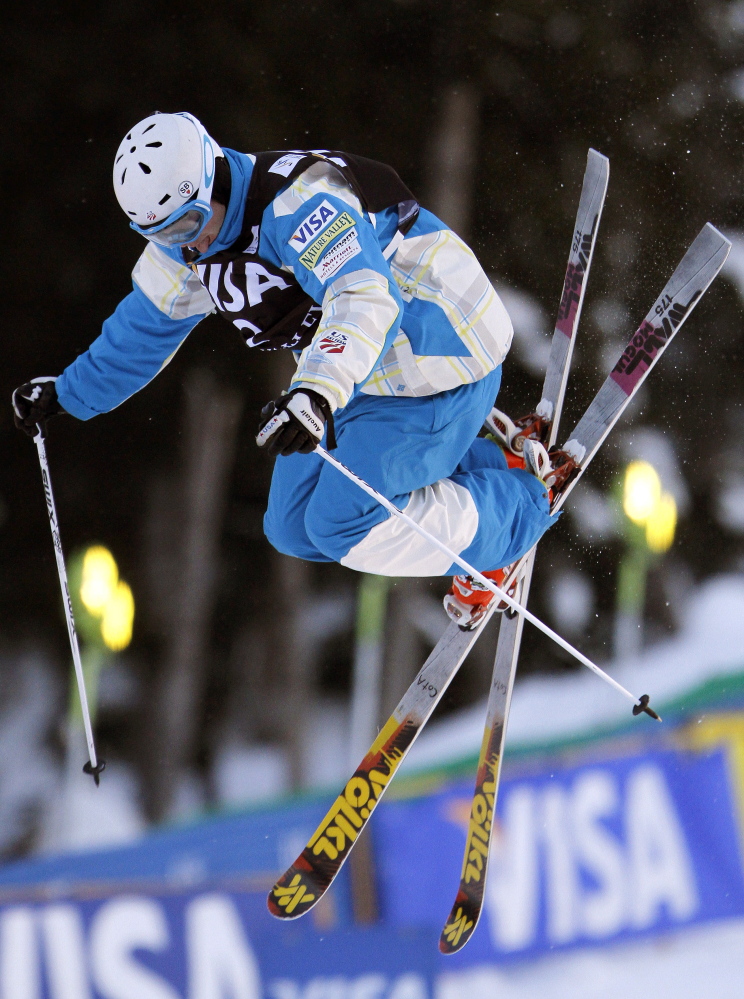Bethel’s Troy Murphy is considered one of the up-and-coming skiers on the U.S. moguls team. The 2014 World Cup Rookie of the Year narrowly missed qualifying for the Sochi Olympics after earning two fifth-place finishes in two World Cup races in January.
Those finishes earned him a promotion to the U.S. moguls B team for the 2014-15 World Cup season. But if Murphy, 22, is going to make the jump into the world’s elite moguls skiers, he’ll have to dig deep into his wallet.
Because he is not on the A team, Murphy has to pay most of his own expenses when it comes to competing on the World Cup tour. He’s not alone.
While U.S. skiers on the A team have their expenses paid for by the team, those still trying to get to that level often have to pay all travel, lodging and meal expenses when they compete.
“It’s definitely a challenge in the smaller sports like this,” said Murphy, who was on the C team a year ago. “(The costs) depend on how you do. There’s very little money in sponsorships at this level.
“But if you’re driven and creative, you can make it work. There’s a lot of gracious people out there willing to help.”
Murphy estimates that it has cost him about $20,000 a year to train and compete on the U.S. team. He recently trained with the U.S. team in both Chile and Switzerland, each trip costing around $3,000.
Over the years he has become quite creative in his fundraising.
He holds annual golf tournaments and auctions to raise much of that money. The golf tournament this year, held on Oct. 12 at the Bethel Inn Resort, raised about $10,000, according to Murphy. “That should help me get through to our next fundraiser,” he said.
That would be an auction he and his family hold in December. Items will include vacation giveaways, Portland Pirates tickets, rounds of golf, Sunday River passes and pottery made by Murphy.
“That’s one of his passions,” said his father, Matt Murphy. “He’ll come home from skiing all day and then at 10 at night he’ll go down and spin pottery until midnight. They are always popular.”
Matt Murphy, who works at Gould Academy, said his son’s costs will likely be higher this winter because of the travel to Europe for World Cup events.
“If we can raise $20,000 that would be great,” said Matt Murphy. “We are getting better at it.”
AN EXPENSIVE CHASE
Nearly anyone who has dreams of skiing or snowboarding for the U.S. in international events knows what Murphy is going through. Seth Wescott, who won the first two Olympic gold medals in snowboardcross, had the same experience when he was trying to make a name in the sport.
“I had a period of years before I got on the U.S. team where it was extremely difficult,” said Wescott, who is fully recovered from the knee injury that kept him from qualifying for the Sochi Olympics. “It went well for me once I was on the team, but even then I’ve had teammates who have been on the B team for many years and I’ve seen their struggle.”
It’s not like this everywhere. Wescott, who is returning to the World Cup circuit this winter and still plans on competing for a spot in the 2018 Winter Olympics in South Korea, cited his competitors in Austria. There they earn a salary from the government while working in either the military or as a policeman. Their job, however, is to train for most of the year.
In America, most of the funds raised by the U.S. Olympic Committee are through private donations or corporate sponsorship. “The U.S. is just very different than any other nation,” said Wescott.
And he doesn’t see it changing. The ideology of sports in this country, he said, is based “on earning your way in. That’s the way we are for Americans.”
That doesn’t make it easier for those still chasing their Olympic dreams.
Jeremy Cota, of Carrabassett Valley, was on the U.S. moguls A team last year, meaning his costs were covered. But he didn’t get the World Cup results needed to stay there, and is now on the C team. That means he’s once again paying for his expenses.
“Certainly money becomes an element,” said his father, Dave Cota, Carrabassett Valley’s town manager. “He’s got a couple of sponsors, but he’s got to watch his dollars, no doubt about that.”
Cota, who turns 26 on Friday, is more fortunate than others. He had a phenomenal 2012 season in which he finished ranked third in the World Cup standings, earning some significant prize money and gaining sponsorships from Bomber skis and the Steamboat resort in Colorado. So he has some money to spend.
Even then, he opted not to go to Chile with the U.S. team last summer, but did go to Switzerland.
“I’m OK for this year because I had a few good years and got some better sponsorships,” said Jeremy Cota. “But it would be nice to have some funding from the team.”
INCLUSIVE INFRASTRUCTURE
Tom Kelly, the vice president of communications for the U.S. Ski and Snowboard Association, said any athlete on the U.S. team, at any level, “has full access to our athletic infrastructure.” That includes coaches, camps, training staff and centers, career counseling, college education services and many other programs.
And he noted that while some athletes might be responsible for their travel expenses, the USSA may cover expenses at certain events.
The USSA announced a partnership earlier this month with RallyMe, recognized as the top crowdfunding site for athletes, teams and organizations. The two have set up a website, USSA.RallyMe.com, specifically to raise funds for USSA members, from grassroots programs to national team members.
Last year, USSA athletes raised more than $500,000 on RallyMe.com for various expenses. Twenty-eight of the athletes competed in the Sochi Olympics. U.S. Cycling and U.S. Bobsled also use RallyMe to raise funds.
Cota, who finished third in the U.S. Nationals last year after the Olympics, said he used RallyMe last year. Beyond the money he raised, he said “it’s definitely cool to see the amount of support you get from your family and friends.”
There are other avenues for athletes needing money too. Murphy mentioned that he had received grants in the past, including several from the Level Field Fund.
The Level Field Fund began in 2000 as the Ross Powers Foundation when Powers, a two-time Olympic snowboard medalist, offered financial aid to Vermont snowboarders. Several years later, Powers joined with Peter Carlisle, the managing director of the Olympics & Action Sports division of Octagon Sports in Saco, to expand the grants to other Olympic sports.
Since 2002, the Level Field Fund has awarded 240 grants totaling over $440,000 to 137 athletes according to Carlisle. Eighteen have competed in the Olympics; four have won medals: Alex Diebold (snowboardcross), Charlie Houchin (swimming), Devin Logan (slopestyle skiing) and Nick Goepper (slopestyle skiing).
NOTHING FOR GRANTED
The grants are based on financial need and can range from a mere $500 to $20,000.
“There is a huge need for this,” said Carlisle.
“The Level Field Fund is designed to address athletes who have the potential and ability and drive, and the only thing holding them back is their financial situation. I’ve seen time and time again where that plays a critical role.”
Forty-nine athletes have applied for the Level Field Fund this year, including Murphy.
“It takes a lot to raise the money,” said Troy Murphy. “But there are a lot of people out there willing to help you.”
Asked if the constant fund-raising was draining, Matt Murphy said, “Oh yeah, but don’t get me wrong, we’ll do whatever it takes. We committed to Troy a long time ago. It would be nice if we didn’t have to ask people for stuff. But we’ll continue to do it.”
What is frustrating to many parents and athletes is that the rules are not consistent throughout the U.S. Olympic programs. Different disciplines, in both summer and winter sports, fund their athletes in different ways.
In biathlon, for example, athletes can receive monthly stipends, ranging from $500 to $2000, if they achieve certain World Cup criteria, according to Max Cobb, the president of U.S. Biathlon.
Cobb said biathlon’s low profile in the sports hierarchy is one reason they offer the stipends.
“We’re not convinced (their athletes) could raise enough on their own to do the things they need to do to be competitive on the international level,” said Cobb.
“Our goal is to minimize the financial burden on those athletes. It’s always going to be a burden, it’s never going to go away in our society. We try to make it an acceptable level.”
There are some who suggest that the system needs to change, that the athletes should be fully funded if they’re expected to compete at the highest levels, or the funding should at least partially trickle down to the lower levels.
But Dave Cota, echoing something Wescott said earlier, said the fundraising is part of how families support their children’s dreams.
“You have no idea what we went through for three or four years,” he said. “We were shelling out as much as some people were paying for college.
“It’s not easy at all. You’ve got to want to do it. And you’ve got to earn it. I think that’s the way it should be.”
Copy the Story LinkSend questions/comments to the editors.






Success. Please wait for the page to reload. If the page does not reload within 5 seconds, please refresh the page.
Enter your email and password to access comments.
Hi, to comment on stories you must . This profile is in addition to your subscription and website login.
Already have a commenting profile? .
Invalid username/password.
Please check your email to confirm and complete your registration.
Only subscribers are eligible to post comments. Please subscribe or login first for digital access. Here’s why.
Use the form below to reset your password. When you've submitted your account email, we will send an email with a reset code.